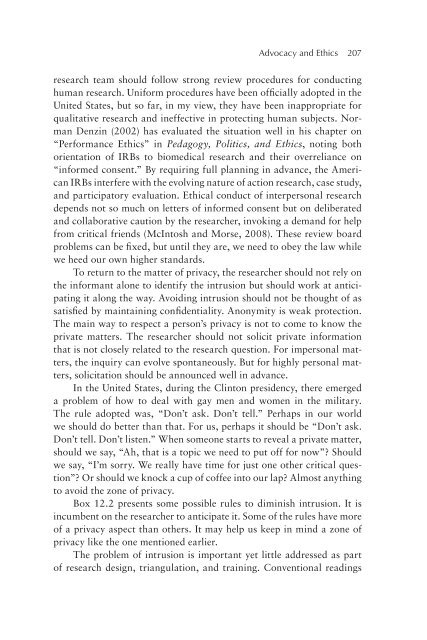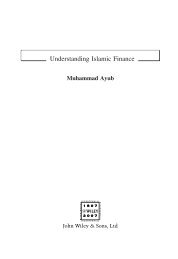How Things Work - Doha Academy of Tertiary Studies
How Things Work - Doha Academy of Tertiary Studies
How Things Work - Doha Academy of Tertiary Studies
You also want an ePaper? Increase the reach of your titles
YUMPU automatically turns print PDFs into web optimized ePapers that Google loves.
advocacy and ethics 207<br />
research team should follow strong review procedures for conducting<br />
human research. Uniform procedures have been <strong>of</strong>ficially adopted in the<br />
United States, but so far, in my view, they have been inappropriate for<br />
qualitative research and ineffective in protecting human subjects. Norman<br />
Denzin (2002) has evaluated the situation well in his chapter on<br />
“Performance Ethics” in Pedagogy, Politics, and Ethics, noting both<br />
orientation <strong>of</strong> IRBs to biomedical research and their overreliance on<br />
“informed consent.” By requiring full planning in advance, the American<br />
IRBs interfere with the evolving nature <strong>of</strong> action research, case study,<br />
and participatory evaluation. Ethical conduct <strong>of</strong> interpersonal research<br />
depends not so much on letters <strong>of</strong> informed consent but on deliberated<br />
and collaborative caution by the researcher, invoking a demand for help<br />
from critical friends (McIntosh and Morse, 2008). These review board<br />
problems can be fixed, but until they are, we need to obey the law while<br />
we heed our own higher standards.<br />
To return to the matter <strong>of</strong> privacy, the researcher should not rely on<br />
the informant alone to identify the intrusion but should work at anticipating<br />
it along the way. Avoiding intrusion should not be thought <strong>of</strong> as<br />
satisfied by maintaining confidentiality. Anonymity is weak protection.<br />
The main way to respect a person’s privacy is not to come to know the<br />
private matters. The researcher should not solicit private information<br />
that is not closely related to the research question. For impersonal matters,<br />
the inquiry can evolve spontaneously. But for highly personal matters,<br />
solicitation should be announced well in advance.<br />
In the United States, during the Clinton presidency, there emerged<br />
a problem <strong>of</strong> how to deal with gay men and women in the military.<br />
The rule adopted was, “Don’t ask. Don’t tell.” Perhaps in our world<br />
we should do better than that. For us, perhaps it should be “Don’t ask.<br />
Don’t tell. Don’t listen.” When someone starts to reveal a private matter,<br />
should we say, “Ah, that is a topic we need to put <strong>of</strong>f for now”? Should<br />
we say, “I’m sorry. We really have time for just one other critical question”?<br />
Or should we knock a cup <strong>of</strong> c<strong>of</strong>fee into our lap? Almost anything<br />
to avoid the zone <strong>of</strong> privacy.<br />
Box 12.2 presents some possible rules to diminish intrusion. It is<br />
incumbent on the researcher to anticipate it. Some <strong>of</strong> the rules have more<br />
<strong>of</strong> a privacy aspect than others. It may help us keep in mind a zone <strong>of</strong><br />
privacy like the one mentioned earlier.<br />
The problem <strong>of</strong> intrusion is important yet little addressed as part<br />
<strong>of</strong> research design, triangulation, and training. Conventional readings

















